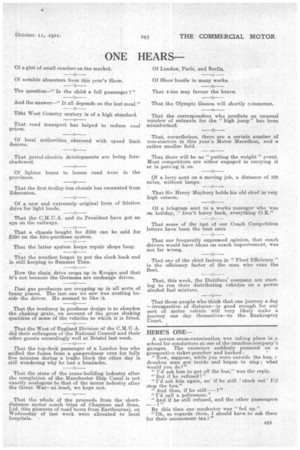ONE HEARS
Page 3

If you've noticed an error in this article please click here to report it so we can fix it.
Of a glut of small coaches on the market.
Of notable absentees from this year's Show.
The question—" Is the child a full passenger ?"
And the answer—" It all depends on the last meal." — That West Country oratory is of a high standard.
That road transport has helped to reduce coal prices.
Of local authorities obsessed with speed limit desires.
That petrol-electric developments are being foreshadowed.
Of lighter buses to lessen road wear in the provinces.
That the first trolley-bus chassis has emanated from Edmonton.
Of a new and extremely original form of friction drive for light loads.
That the C.M.T.T.A. and its President have got an eye on the railways.
That a chassis bought for £350 can be sold for 550 on the hire-purchase system, That the latter system keeps repair shops busy.
That the, weather forgot to put the clock back and is still keeping to Summer Time.
'How the chain drive crops up in Krupps and that it's not because the Germans are exchange driven.
f hat gas producers are cropping up in all sorts of flmny places. The last one we saw was nestling beside the driver. He seemed to like it.
That the tendency in producer design is to abandon the shaking grate, on account of the great shaking qualities of some of the vehicles to which it is fitted.
That the West of England Division of the C.M.U.A. did their colleagues of the National Council and their other guests exceedingly well at Bristol last week.
That the top-deck passenger of a London bus who sniffed the fumes from a gas-producer vent for fully five minutes during a traffic block the other day is still wondering why he had a headache.
nat the state of the crane-building industry after the completion of the Manchester Ship Canal is not exactly analogous to that of the motor industry after the Great War—at least., we hope not.
That the whole of the proceeds from the shortdistance motor coach trips of Chapman and Sons, Ltd. (the pioneers of road tours from Eastbourne), on Wednesday of last week were allocated to local hospitals. Of London, Paris, and Berlin, Of Show hustle in many works.
That 4-ton may favour the brave.
That the Olympic Games will shortly commence.
That the correspondent who predicts an unusual number of entrants for the " high jump," has been misinformed.
That, nevertheless, there are a certain number of non-starters in this year's Motor Marathon, and a rather smaller field.
That there will be no "putting the weight" event. Most competitors are either engaged in carrying it or in putting it on.
Of a lorry sent on a moving job, a distance of 120 without lamps.
Of a telegram sent to a works manager who was on. holiday, "Don't hurry back, everything O.K."
That some of the last of our Coach Competition letters have been the best ones That our frequently expressed opinion, that coach drivers would have ideas on coach improvement, was not far wrong.
That one of the chief factors in " Fleet Efficiency" is the efficiency factor of the man who runs the fleet.
That, this week, the Distillers' company are starting to run their distributing vehicles on a power alcohol fuel mixture.
That those people who think that-one journey a day —irrespective of distance—is good enough for any sort of motor vehicle will very likely woke a journey one day themselves—to the Bankruptcy Court.




















































